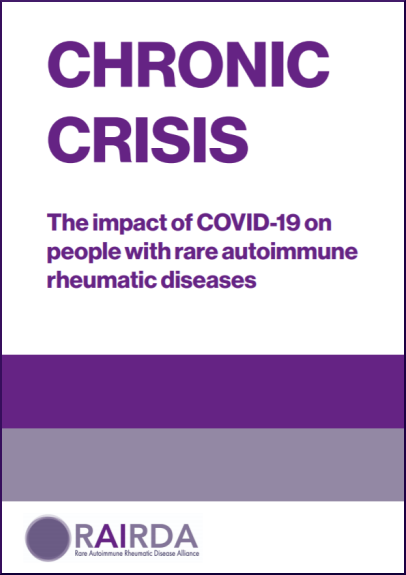
People with lupus are at risk because of the COVID-19 pandemic
 December 04th, 2020
December 04th, 2020 Nakita Cambow
Nakita Cambow Blog, Latest News
Blog, Latest News 0 Comments
0 Comments
A new study has shown that people with rare autoimmune rheumatic diseases (such as lupus) are more at risk of dying during the COVID-19 pandemic.
 This study from the RECORDER project (Registration of Complex Rare Diseases Exemplars in Rheumatology) looked at the electronic health records of nearly 170,000 people in England with rare autoimmune diseases. They found that during March and April 2020, the first two months of the COVID-19 pandemic in England, 1,815 people with these diseases died (1.1%). This was 1.44 times higher than the average during the same months of the previous 5 years. For comparison, in the general population of England, deaths were 1.38 times higher.
This study from the RECORDER project (Registration of Complex Rare Diseases Exemplars in Rheumatology) looked at the electronic health records of nearly 170,000 people in England with rare autoimmune diseases. They found that during March and April 2020, the first two months of the COVID-19 pandemic in England, 1,815 people with these diseases died (1.1%). This was 1.44 times higher than the average during the same months of the previous 5 years. For comparison, in the general population of England, deaths were 1.38 times higher.
Other main findings included:
- Women with rare autoimmune rheumatic diseases had a similar risk of death during COVID-19 as men – whereas usually their risk of death is lower.
- The risk of working age people with rare autoimmune rheumatic diseases dying during COVID-19 was similar to that of someone 20 years older in the general population.
This study is an important step in helping us to understand the impact of the COVID-19 pandemic on people with lupus in the UK. The findings demonstrate that, as a group, people with conditions such as lupus have been disproportionately impacted and therefore the provision of additional support is necessary.
At first glance this data may suggest that people with lupus have been dying because of COVID-19 infection, but it is important to acknowledge that this study does not identify the cause of death. From discussions with clinicians in UK-based specialist centres we understand that they have seen fewer lupus patients with severe-COVID than they initially feared. However, there have been reports of lupus patients experiencing flares of their disease and some avoiding seeking help due to fears of contracting the virus, especially during the initial lockdown in the spring.
Study co-author, Dr Fiona Pearce from the University of Nottingham, said: “The next step in our research is to look at death certificate data and find out why people have died. We’ll be examining whether it’s due to COVID-19 infection or how much is due to the disruption to healthcare services.”
 Many people with lupus have reported difficulty in accessing their healthcare since the pandemic began in March 2020. This was demonstrated in a report by the Rare Autoimmune Rheumatic Diseases Alliance (RAIRDA) which found 80% of people with these conditions had experienced a change in their care and 37% said that their ability to manage their condition had been affected as a result. There was an overwhelming sense of ‘abandonment’ during the first lockdown. Whilst this study is looking specifically at the increase in deaths from the pandemic, we know that the impact has been much wider than this. There are many people experiencing prolonged periods ill-health or deterioration of symptoms because of changes to their care.
Many people with lupus have reported difficulty in accessing their healthcare since the pandemic began in March 2020. This was demonstrated in a report by the Rare Autoimmune Rheumatic Diseases Alliance (RAIRDA) which found 80% of people with these conditions had experienced a change in their care and 37% said that their ability to manage their condition had been affected as a result. There was an overwhelming sense of ‘abandonment’ during the first lockdown. Whilst this study is looking specifically at the increase in deaths from the pandemic, we know that the impact has been much wider than this. There are many people experiencing prolonged periods ill-health or deterioration of symptoms because of changes to their care.
We understand that clinicians and health service leaders are determined that services will not be similarly disrupted during further waves of the pandemic, nor do they want patients to be discouraged from seeking help due to their concerns about COVID-19. In some areas, there are plans to keep some hospitals COVID-free whilst in others, rigid infection control will prevent transmission in hospitals.
The findings from this research are very important and they will help steer clinicians and policy makers throughout the rest of the COVID-19 pandemic when they are deciding which healthcare services to focus on or which people should be prioritised for shielding guidance and vaccine administration.
If you have lupus and would like more information and guidance for the pandemic, please take a look at our article HERE.
“Risk of death among people with rare autoimmune diseases compared to the general population in England during the 2020 COVID-19 pandemic.”
Emily Peach, Megan Rutter, Peter Lanyon, Matthew J Grainge, Richard Hubbard, Jeanette Aston, Mary Bythell, Sarah Stevens, Fiona Pearce
medRxiv 2020.10.09.20210237; doi: https://doi.org/10.1101/2020.10.09.20210237
The RECORDER project (Registration of Complex Rare Diseases Exemplars in Rheumatology) is a joint initiative between the University of Nottingham and the National Disease Registration Service at Public Health England.



 ©2024 LUPUS UK (Registered charity no. 1200671)
©2024 LUPUS UK (Registered charity no. 1200671)